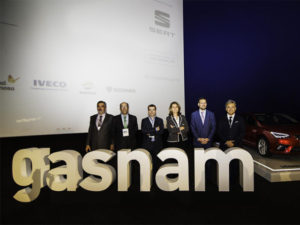Seat pushes for CNG as alternative to electrification
Seat will spearhead development of CNG technology for the entire Volkswagen Group, which the company sees as a viable alternative to established fuels and electric vehicles, the brand’s president Luca de Meo announced at GASNAM Congress in Madrid.

Seat president de Meo told the GASNAM Congress that CNG is “a sustainable, profitable alternative to traditional fuels and the electric vehicle”.
Citing benefits including that minimal investment would be required to get a CNG network going as the technology already exists and widespread public adoption would not require a steep learning curve, Mr de Meo said: “CNG is not just a bridge technology, but a real long-term alternative.”
Further benefits de Meo highlighted included a reduction of CO2 and significant cost savings to drivers.
However, Mr de Meo did not believe that Seat could go it alone and rather that, “the cooperation of competitors, institutions and other companies [would be necessary] in order to create an ecosystem and manage to make CNG an alternative to electrification”.
Mr De Meo said that the challenge to install “300 gas stations in Spain until 2020” would be met by the company alongside others with vested interests attending GASNAM (the Iberian association for gas-powered mobility).
The brand’s 1,000 engineer-strong Seat Technical Centre will serve as the nerve centre to spearhead development of CNG technology for the whole Volkswagen Group, with de Meo saying: “We want this to be technology made in Spain, we want to be pioneers and are confident we are going to achieve it,” adding that the technology is “a sustainable, profitable alternative to traditional fuels and the electric vehicle”.
Compressed Natural Gas or CNG is said to result in a cost saving of 55% compared to petrol and 30% compared to diesel.
Seat predicts that registrations of vehicles fuelled with CNG could reach a million by 2030 – with Spain already witnessing a ten-fold increase so far this year.

